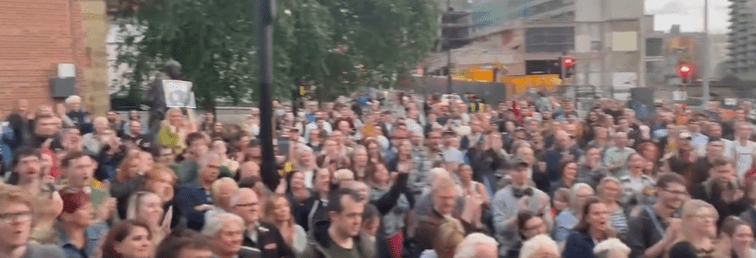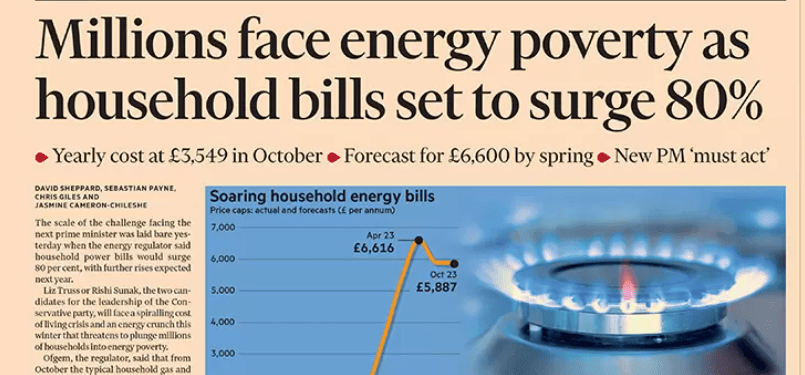By John Pickard
In one of the best presentations we’ve had at Left Horizons Zoom meetings, the Marxist economist, Michael Roberts, gave a graphic, if grim, description of the looming crisis of inflation in modern society.
Although inflation is a feature of the whole global capitalist economy, among the more advanced countries at least, it affects the UK more than most others. The cost-of-living crisis affects different parts of the population by different degrees and using graphs to illustrate this, Michael showed that in a list of twenty-five European countries, that effect was particularly notable in the UK.
The gap between the ‘hit’ for the top 20% earners and the lowest 20% of earners was almost the worst of the twenty-five countries, with only Estonia behind us. In the UK, the top fifth are looking at a cut in living standards of 6-7% but the bottom fifth are facing a cut of around 16%. It is not surprising, therefore, that there is a massive groundswell of strikes as workers across the country are fighting for wage rises that keep up.
The international comparisons do not end there, because the UK Government is also the most tight-fisted when it comes to spending on relief for energy costs. Here household support amounts to £19bn, compared to £23bn in Spain, £38bn in France, £42bn in Italy and £51bn in Germany. Note that the total UK household support is around half the money spent on an utterly useless (but highly lucrative) ‘Test and Trace’ contract during the worst of the Covid pandemic.
Inflation crisis is not going away any time soon
The energy and inflation crisis is not going to go away any time soon. The boss of Shell, for whom there is no crisis at all, since his company is making tens of billions in additional profits, has warned of “rationing of energy” for “several years”. The energy minister of Belgium has warned of “terrible winters” for “five to ten years”.
With financial giant Goldman Sachs now suggesting that inflation might reach 22% in Britain next year, as Michael Roberts pointed out, workers are facing the biggest and most prolonged cut in their living standards since the Napoleonic Wars, over two hundred years ago. Energy, food and many other necessities will indeed be “rationed”, simply by virtue of the fact that they are unaffordable.
The projected level of inflation, Roberts explained to the meeting, “will leave the average worker almost £13,000 a year worse off by the middle of the 2020s”. According to the Institute of Fiscal Studies, the rate of inflation “will mean an unprecedented two-decade hit to earnings that would leave average household disposable income 42% lower than it would have been had wages grown at pre-2008 financial crisis rates”.
The Institute of Fiscal Studies has also said that by 2026, average household earnings will be £30,800, but this compares with a whopping £43,700 if wages had continued to rise at the same pace as they did in the two decades before the banking crisis of 2008.

The biggest single item in the soaring rate of inflation is the cost of energy. It impacts particularly hard on the lowest paid and those on benefits, because they pay a far higher proportion of their income on heating, cooking and lighting. As a proportion of their income, the poorest tenth pay three times as much as the richest tenth of the population. As a result of this, there are serious concerns, now being aired in all the more serious parts of the media, about how families will cope.
The myth that wage rises cause inflation
In reality, they will not be able to cope. Michael showed on a slide a picture of a post from social media from someone who lived alone and had a notification of an increase in the energy bill from £126 a month to £620 a month! “How the actual fuck can THIS be right?” he wrote, “And I’m in a reasonable job. But I just can’t afford this. No fucking way”.
By a series of graphs and explanations, Michael also punctured the myth that wage rises are the ‘cause’ of inflation. As the prices of raw commodities and supplies rises – and the current inflation at root is a crisis of production and supply – it would be perfectly possible to reduce profit to keep prices stable, but, naturally enough, this is not an option favourable to capital.
It is clear that the majority of the Tory government – most of whom seem to be on permanent holiday anyway – are completely oblivious to depth of feeling on this issue and the hurricane of opposition that will build up over inflation. Even the Labour leadership have only offered a half-hearted answer, with an energy freeze for six months, and at prices already too high for the poorest families to support.
The Starmer ‘freeze’ is, in effect, a massive multi-billion pound ‘bung’ to the energy providers and distributors, guaranteeing their shareholders’ profits at tax-payers’ expense. Further down the line, this temporary price freeze will have to be passed back to tax-payers and consumers.
Nationalisation has massive popular support
Unlike the majority of the voting public – Tory voters included – Keir Starmer is dead set against the sensible idea of nationalising the energy production and distribution systems. In this regard, he has set his face against the policy agreed by Labour’s national conference, by the TUC and even against his own ‘pledges’ that he published when he was running for leadership.

As Michael Roberts pointed out in his presentation, the big five energy retailers and other smaller retailers could be brought into public ownership at a similar cost (under £2.85bn) to what the government has already spent on keeping one failed energy supplier, Bulb, in business. Nationalisation is a policy whose time has come.
In the discussion after Michael’s presentation, there were several references to the ‘Enough is Enough’ campaign, which is rapidly gaining traction across the country. Comparisons were made to the anti-poll tax movement in the late 1980s, a movement that was based on non-payment and which eventually encompassed millions of households. This movement effectively brought about the end of the ‘Iron Lady’, Margaret Thatcher.
What we will face when heating bills start to land in October, just when the weather is starting to get colder, will be on a scale that will dwarf even the anti-poll tax movement. Nothing the Tories (or the feeble Starmer ‘opposition’) are suggesting does anything more than tinker with a profound problem.
What we will see will be an extreme sharpening and an intensification of politics and all forms of struggle, fought out in workplaces and through demonstrations, rallies and meetings. If there is no worthwhile relief from an attack on living standards unprecedented in modern times, then the inevitable consequence will be social upheaval, also on a scale unprecedented in modern times.
We will post the presentation by Michael Roberts from the meeting on Tuesday August 30, on the Left Horizons YouTube channel as soon as possible. The slides from the presentation can be found here.



